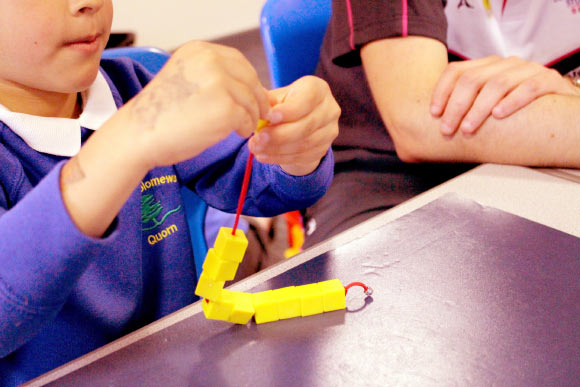According to a team of researchers at Loughborough University, UK, many four-year-olds are not physically ready to start school.

Movement for Learning. Image credit: Loughborough University.
“A child’s physical development level impacts their ability to complete simple tasks such as sitting still, holding a pencil, putting on their shoes, and especially reading – all skills essential for school,” said team leader Dr. Rebecca Duncombe, of the Loughborough University’s School of Sport, Exercise and Health Sciences.
“Our research shows that not only are children starting school less physically ready than ever before, but that teachers are noticing this change and its impact in the classroom.”
The scientists tested 45 Foundation Stage children at two different schools and found a larger number than previously estimated are experiencing problems with balance and coordination that are impacting their ability to learn in class.
The team used a range of tests to assess children’s physical development at the start of the school year and found just under 30% were ‘of concern’ with almost 90% demonstrating some degree of movement difficulty.
The tests therefore reveal up to 30% of children are starting school with symptoms typically associated with dyslexia, developmental coordination disorder, and attention deficit hyperactivity disorder (ADHD).
A supplementary study that questioned over 25 primary school teachers also revealed teachers believe children are starting school less physically ready than ever before, with 80% of teachers identifying the decline having happened in the last three to six years.
Over the last year, Dr. Duncombe and Movement for Learning program leader Professor Pat Preedy have worked with classes at an independent and state school in England to pilot a program designed to redress the decline in pupils’ physical development.
Movement for Learning is a daily program that gives children opportunities to move, improve fine and gross motor skills, and inhibit primitive reflexes. Activities include throwing, catching, balancing, articulating sounds and skipping.
Two classes followed the program over the school year and teachers have reported impressive early results.
“Children today are moving less, they’re developing less well, and they’re learning less; we need to do something drastic to make sure children now and in the future get the movement they need to develop properly physically, intellectually and emotionally,” Prof. Preedy said.
“Research shows there is a link between early movement and children’s development and learning.”
The researchers are now extending the Foundation Stage pilot to 30 schools and are in the process of recruiting Year One classes for the forthcoming school year.
Their findings will be published in the journal Sport, Education and Society.
_____
Rachel Sandford et al. 2015. Ability to be active: exploring children’s active play in primary schools. Sport, Education and Society 4 (2); doi: 10.1080/21594937.2015.1060569
Jo Harris et al. Young people’s knowledge and understanding of health, fitness and physical activity: issues, divides and dilemmas. Sport, Education and Society, published online September 3, 2016; doi: 10.1080/13573322.2016.1228047







